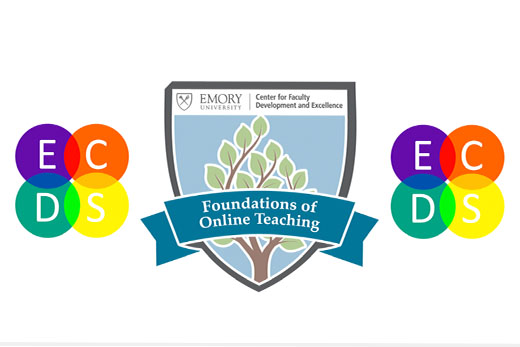The Emory Foundations for Online Teaching (EFOT) course provides graduate students with professional development training in online teaching. Led by a dedicated team of graduate students, EFOT began as a partnership between Emory's Center for Digital Scholarship (ECDS) and the Center for Faculty Development and Excellence in 2014. The course is now housed primarily in ECDS, with support from the LGS Office of Professional Development and Career Planning (PCDP).
"Our partnership in this program is part of a broader effort at Emory to support faculty and graduate students as they leverage new online tools and adapt to remote teaching environments while continuing Emory's tradition of teaching excellence," says Robert Pearson, PhD, Assistant Dean of Professional Development and Career Planning at the Laney Graduate School. "I am so proud that EFOT training has reached nearly 80 teaching assistants this summer. To me, this demonstrates Teaching Assistants' commitment to providing an exceptional educational experience for their students at Emory this Fall and also their intellectual generosity and initiative."
Under Pearson’s leadership, PDCP provides support in the form of stipends for the instructors. COVID-19's impact on the structure of education has made EFOT an attractive training program for strengthening key teaching skills in virtual settings.
"Students who choose to take this EFOT training are leaning into the moment, so to speak, and adapting to this new context," Pearson says. "Initiative, adaptability, and commitment to the mission are real career skills that I hope EFOT students will brag about in their future job applications and interviews. Employers in every sector routinely express that these skills are highly desirable and are surprisingly rare."
Formerly an EFOT student, Shari Wesja, co-manager and co-instructor of the course, joined as a teaching assistant for two summers. But in her fourth year, when the lead instructor at the time, Chris Adamson, graduated, she took up the reins.
According Wejsa, the course includes both synchronous zoom sessions and asynchronous discussion boards. In the zoom sessions, students participate in mock scenarios that they may encounter in online teaching settings. The discussion boards allow students to engage with classmates and submit assignments when it is most convenient to their schedule.
In particular, the asynchronous format accommodates students whose circumstances limit their ability to participate in the synchronous sessions. Wejsa, also a student in the LGS History program, explains that this arrangement helps students overcome a number of barriers to their education.
"Some of these challenges include limited or unreliable Internet access, restrictions from not having a laptop but instead using a Smartphone, and time zone differences," Wejsa says. "Our instructional team has remained highly attentive to these challenges."
The asynchronous discussion boards also help build community in the class. Instructors and students regularly leave video and audio responses, post memes and images, link to news stories, and like comments to provide positive feedback during the discussions. Additionally, EFOT invited Sarah Morris, Head of Instruction and Engagement at the English Subject library, to discuss strategies for strengthening community in an online environment.
"It's great to have students connect and see those connections continue throughout the other sessions in EFOT," Wejsa explains.
EFOT’s willingness to adapt to the pandemic has enabled to program to expand. Before, the program would take students through five weeks of intensive training with online modules. Due to the growth of interest in the program, EFOT has extended its curriculum to cover five modules in six weeks and now has a waiting list for stipend spots.
"In past summers, EFOT offered one course that usually had two sections. However, due to the increased interest this year, we had to offer a second EFOT session one week after finishing the first one," says Islamic Civilizations Studies PhD candidate, Norah Elmagraby. She has worked as a graduate intern with ECDS since 2018 and joined the EFOT as a Teaching Assistant earlier this year.
"Over 50 students signed up for the second EFOT session. Courses like EFOT are needed as graduate students start to navigate the online teaching environment," Elmagraby explained. "We get asked a lot whether we will offer EFOT again during the Fall semester. I think there will be an increased interest in this training throughout the academic year."
Elmagraby is one part of Wejsa's core team, consisting of English PhD student, Bailey Betik, and the newest recruit, Environmental Health Science PhD, Elizabeth Sajewski. Together, the instructors help their fellow graduate students become better educators.
"My primary motivation for joining EFOT was that I love teaching—it's what drives me," she says. "It's imperative now for graduate students to have access to training in best practices for teaching in general and specifically for online teaching."
By imparting this knowledge to students, Wejsa hopes EFOT will produce self-reflective teachers who continuously seek to improve their methods of instruction. This emphasis on self-reflective teaching encourages Wejsa and her team to ensure that the course speaks to a variety of disciplines as well.
"It has been enriching for other students and us, seeing how students in the sciences perceive the benefits and challenges of the discussion board, or how students in the business school would approach creating an instructional video or assessment. EFOT is for everybody,” she says.
EFOT is an increasingly valuable tool for graduate students as LGS continues to provide new avenues to enhance scholarship and training during a global pandemic.
"The online teaching skills EFOT students acquire will directly benefit Emory's undergraduate students and our whole community," says Pearson. "But they also demonstrate initiative and a willingness to contribute to a bigger mission and professional growth."

